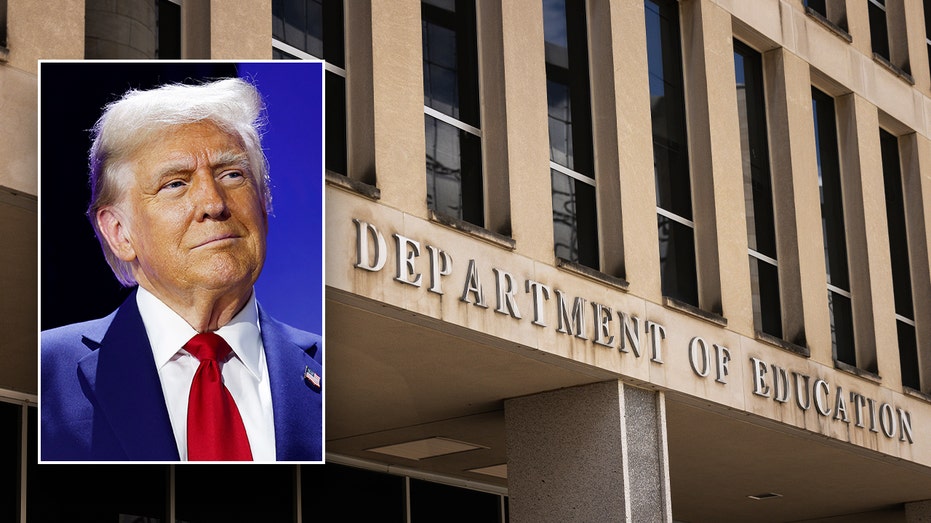Trump would need congressional approval to dissolve Education Department, experts say

President-elect Trump wants to abolish the Department of Education (DOE), but experts suggest the incoming commander in chief would need congressional approval before doing so. “One thing I’ll be doing very early in the administration is closing up the Department of Education in Washington, D.C., and sending all education and education work it needs back to the states,” Trump said on the campaign trail. As Trump solidifies his agenda for a second term, attorneys explained the legal process he would have to go through before proceeding with plans to dissolve the federal department. Andrew Stoltmann, an attorney and law professor, told Fox News Digital Trump would need approval from a supermajority in Congress to do away with the DOE. BETSY DEVOS JOINS TRUMP’S CALL TO ‘DISBAND’ THE DEPARTMENT OF EDUCATION AND ‘RE-EMPOWER’ FAMILIES “President Trump does not have the ability to eliminate a federal department. Eliminating it would require congressional action, including a supermajority of 60 votes in the Senate,” Stoltmann said. “So, even if Trump can follow through with what he says, he has to pull in some Democrats in the Senate, and that will likely be impossible.” TRUMP PLANS TO SHIFT SCHOOL FUNDING CONTROL TO LOCAL COMMUNITIES, HAS YET TO PICK DOE SECRETARY Stoltmann suggested the most realistic scenario is if Trump appoints someone aligned with his agenda to head the department. “He would need 60 votes in the Senate, and the realistic chances of that are virtually zero,” he told Fox. “Trump‘s best bet is to appoint somebody who will effectively be a figurehead at the Department of Education. This doesn’t eliminate the department, but it effectively neuters it during his term.” Jamie E. Wright, a political pundit and founder of the Wright Law Firm, told Fox that to dissolve the department, Congress would need to pass new legislation that addresses the laws establishing and sanctioning the department. “To pass such a bill successfully into law would require backing from members of Congress for the president’s agenda to advance smoothly through the legislative process — an endeavor that may present obstacles should opposition arise from legislators who consider the Department of Education crucial in ensuring consistent national educational guidelines and federal funding allocation for education initiatives,” Wright told Fox. “Removing an agency could pose a challenge due to the need for widespread political backing, unity in Congress and broad public approval.” Republicans have called to dismantle the agency for decades since former President Carter established the department in 1979. Former President Reagan championed abolishing the education department and that decisions regarding schools be determined at the local level. Rep. Barry Moore, R-Ala., introduced legislation in 2023 to “abolish the Department of Education and to provide funding directly to states for elementary and secondary education,” but the bill did not pass. If the department remains intact, there are several candidates rumored to be potential candidates to head the education unit under Trump, including his former Education Secretary Betsy DeVos.
Rahul Gandhi mocks PM Modi’s ‘ek hain to safe hain’ remark, targets Gautam Adani, says, Dharavi project designed to…

Gandhi framed Maharashtra elections as a contest between aspirations of common people and influence of a few wealthy individuals, particularly industrialist Gautam Adani
Kerala lottery TODAY November 18 Live WIN WIN 680 Monday lucky draw result to be out at 3 pm, check full winners list

The Kerala lottery results are announced daily, with specific draws taking place throughout the week. The state-run lottery system features several different games, each assigned to a particular day.
Day after quitting AAP, Kailash Gahlot joins BJP

Addressing the media after joining the party, Gahlot said efforts are being made to build a false narrative that his decision to quit the AAP was the result of ED and CBI pressure.
Brazil welcomes PM Modi with vedic chants and traditional festivities ahead of G20 summit

Prime Minister Narendra Modi was welcomed by Brazilian Vedic scholars chanting Sanskrit mantras upon his arrival in Brazil for the G20 summit on Monday. The group of Vedic scholars, comprising men and women of all ages, sang melodious Sanskrit shlokas in PM Modi’s presence. They were dressed in traditional Indian attire, and the Prime Minister keenly listened to their harmonious recitation.
Shillong Teer Results TODAY November 18, 2024 Live Updates: Check lucky winning numbers

Participants can check the winning numbers from various games conducted by the Meghalaya Lottery Department, including Shillong Teer, Juwai Teer, Shillong Morning Teer, Khanapara Teer, Jowai Ladrymbai, and Night Teer.
Indigo, SpiceJet issue advisory for passengers as toxic smog engulfs Delhi

The airlines advised passengers to allow extra travel time and check flight status before starting their journey as flights get affected due to poor visibility in Delhi.
West Bengal Violence: 15 held, internet shut down after clashes between two groups in Murshidabad

Trouble began late Saturday night when a group of youths assembled near a Kartik puja pandal alleging that an objectionable message hurting their sentiments popped up on the digital display board on the gate erected for the festival.
Gaetz-gate: Navigating the President-elect’s most baffling Cabinet pick

Former Rep. Matt Gaetz, R-Fla., may be done with Congress. But Congress is not done with him. And as President-elect Trump’s pick to serve as Attorney General, Gaetz is apparently not done with Congress, either. Gaetz negotiated with Mr. Trump to become Attorney General on a flight to Florida – just hours after the incoming President spoke to House Republicans in Washington last week. Mr. Trump then made Gaetz his pick and the Florida Republican resigned. What wasn’t known at the time was that the House Ethics Committee was on the precipice of releasing a report investigating allegations of “sexual misconduct” and “illicit drug use” by Gaetz. Gaetz stopped cooperating with the House investigation over the summer. The FBI probed Gaetz for years – but dropped its inquiry in February. The Ethics Committee dashed a planned meeting where it likely would have published information about its inquest regarding Gaetz on Friday. But since Gaetz is no longer a Member of Congress, the committee supposedly is powerless to act. THE HITCHHIKER’S GUIDE TO POTENTIALLY RELEASING THE ETHICS COMMITTEE REPORT ON GAETZ House Ethics Committee Chairman Michael Guest, R-Miss., said the following on Wednesday when asked about the Gaetz probe – but before the Florida Republican resigned. “Once the investigation is complete, then a report will be issued – assuming that at that time, that Mr. Gaetz is still a Member of Congress. If Mr. Gaetz were to resign because he is taking a position with the administration as the Attorney General then the Ethics Committee loses jurisdiction at that point. Once we lose jurisdiction, there would not be a report that would be issued. That’s not unique to this case,” said Guest. Other Ethics Committee members tried to sidestep discussion of Gaetz. “I’m not making any comments on that. I’m on the Ethics Committee so I’m staying clear of that,” said Rep. John Rutherford, R-Fla. “Can you still release the report?” asked Rachel Scott of ABC. “Nope. Sure can’t,” replied Rutherford, turning toward Scott. A NARROW MARGIN: TRUMP TAPS HOUSE REPUBLICANS FOR HIS SECOND ADMINISTRATION That is generally how the House Ethics Committee rolls when it comes to outstanding investigations involving former Members. But it is not a hard and fast rule. Fox has found that the Ethics Committee released the information on its probe into potential influence peddling by the late Rep. John Murtha, D-Penn., after his death in 2010. The Ethics Committee also released a 699-page report on former Rep. Bill Boner, D-Tenn., after he left office in 1987. The committee found that Boner used campaign funds to travel to Hong Kong and may have used his office to influence a defense contractor. The Ethics Committee investigated former Rep. Mark Foley, R-Fla., after he was caught sending inappropriate messages to House pages in 2006. Foley abruptly resigned from the House. But the ethics panel hauled in a host of bipartisan Congressional leaders for closed door depositions to determine what they may have known about Foley’s activities. That said, there is a way on the floor to dislodge an Ethics Committee report. WHAT HAPPENS TO THE GAETZ HOUSE ETHICS REPORT? There is a mechanism called “question of privileges of the House.” A lawmaker could take the floor under this procedure, making the argument that keeping the Gaetz ethics report under wraps impugns the dignity and integrity of the House. The House would be required to vote on such a motion. If successful on the floor, the ethics panel could be compelled to release the report. Yours truly asked House Minority Leader Hakeem Jeffries, D-N.Y., if Democrats might try to dislodge the Gaetz report from the Ethics Committee. Pergram: “Could you envision a scenario where Democrats try to somehow dislodge this ethics report through a parliamentary maneuver?” Jeffries: “The Ethics Committee is an incredibly bipartisan committee. It’s the only committee in the Congress that is evenly divided. And it has a long history of having principled individuals on it. And I defer at this moment to whatever course they decide to take. And I hope they take a course that is bipartisan.” The Senate Judiciary Committee will study the credentials of Gaetz, run background checks and ultimately hold a confirmation hearing before voting the nomination to the floor for a vote. It could also block the nomination as well. Senate Majority Whip and Judiciary Committee Chairman Dick Durbin, D-Ill., formally asked the House Ethics Committee to send over the report as it reviews the fitness of Gaetz for the job. MATT GAETZ’S NOMINATION ROCKS CAPITOL HILL “The sequence and timing of Mr. Gaetz’s resignation from the House raises serious questions about the contents of the House Ethics Committee report,” said Durbin. “This information could be relevant to the question of Mr. Gaetz’s confirmation as the next Attorney General of the United States and our Constitutional responsibility to advise and consent.” Democrats weren’t the only ones trying to pry loose the report. “I think there should not be any limitation on the Senate Judiciary Committee’s investigation, including, whatever the House Ethics Committee generated,” said Sen. John Cornyn, R-Texas. Rep. Glenn Ivey, D-Md., serves on the Ethics Committee. He hinted that the panel should consider dispatching the report to the Senate. “I think the Senate certainly had a right to request it. I can’t talk about our internal deliberations. But the information that they’ve requested, I think it’s totally reasonable,” said Ivey. “In fact, I think it’s essential for them to get that kind of information before they make a decision.” On Friday, Johnson noted that he “doesn’t control the Ethics Committee.” THE HITCHHIKER’S GUIDE TO THE MEANING OF A REPUBLICAN SENATE – AND WHAT’S AHEAD FOR THE HOUSE But Johnson went further than he had before about his views on releasing the report. “We should stick to the tradition of not releasing a report on a former Member of the House because it would open a dangerous Pandora’s box,” said Johnson. Johnson reaffirmed that during an appearance on Fox News Sunday
Delhi Pollution: Air quality plummets to ‘severe+’ category as AQI inches closer to 500 in Delhi-NCR, GRAP IV imposed

Under the GRAP stage 4, the authorities suspended in-person classes for all except for students of classes 10 and 12. Entry of trucks into Delhi has been prohibited except for the trucks carrying essential commodities and services.
